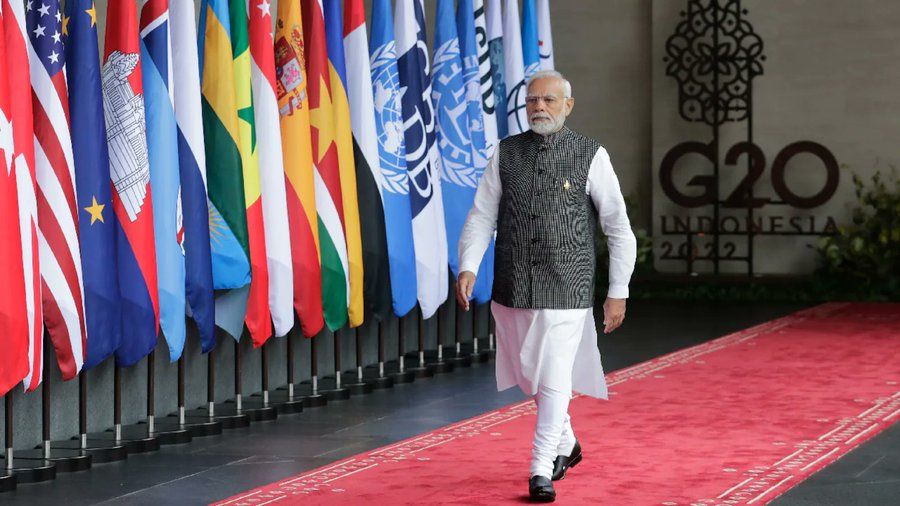
Decoding the G20: India's Crucial Role in a World of Crisis

Title: "Decoding the G20: India's Crucial Role in a World of Crisis"
Introduction: Navigating the G20 in 10 Tweets
In the era of information overload, where every global event generates an avalanche of news and analysis, sometimes, all you need are 10 tweets to get to the heart of the matter. Such is the case with the G20, an international forum that often finds itself in the limelight. The G20 comprises 19 of the world's largest economies and the European Union, collectively accounting for a staggering 85% of global GDP and housing two-thirds of the world's population. But what's the G20 all about, and why does it matter? Let's break it down.
Section 1: The G20 Unveiled
The Group of Twenty, or G20, is a coalition of the world's leading economies, designed to promote global financial stability and economic cooperation. It emerged in response to the 2008 financial crisis as a crucial platform for addressing economic challenges. It's the brainchild of the international community's realization that a global response was needed to prevent such a crisis from happening again. In essence, the G20 serves as a collective mechanism to stabilize the global economy and foster cooperation among nations.
Section 2: Critiques and Challenges
As with any international organization, the G20 has faced its share of criticism. Critics argue that its sheer size and lack of a clear, singular focus have made it less effective than intended. With diverse agendas and priorities among member nations, reaching a consensus can be challenging. However, the flexibility of the G20 allows each presiding country to shape the agenda according to its unique circumstances and priorities.
Section 3: G20 in the Spotlight
In recent years, the G20 has faced renewed relevance due to a series of global crises. The COVID-19 pandemic sent shockwaves through economies worldwide, particularly affecting developing countries. Additionally, the Ukraine war has led to significant increases in the prices of essential commodities, including food and energy. The G20's mission, fundamentally centered around crisis management, is once again in the global spotlight.
Section 4: India Takes the Helm
India currently holds the presidency of the G20, a role it is using to address the concerns of developing nations. This includes tackling critical issues such as food security, rising energy costs, and burgeoning debt problems. For India, this is a pivotal moment. It seeks to assert itself as a global leader by facilitating solutions to global challenges.
Section 5: India's Ambitions
India's ambitions on the global stage are evident. Over the past year, it has vigorously urged countries to collaborate on climate finance, advocate for reforms within institutions like the World Bank, and take meaningful steps towards a sustainable future. Now, as the host of the G20 Leaders' Summit, India has a unique opportunity to enact real change on a global scale.
Section 6: The G20 Leaders' Summit
The grand finale of India's presidency is the G20 Leaders' Summit, scheduled to be held in Delhi. During this event, major world leaders, including US President Biden, will gather to discuss and address the pressing issues of our time. India aims to expand the G20 by including the African Union, expedite debt relief for impoverished countries, and advocate for necessary reforms within the World Bank.
Section 7: The Divisions Over Ukraine
However, this year's G20 Summit faces significant challenges. The ongoing Ukraine war has created deep divisions within the group. While Western nations prioritize the conflict, Russia and China have shown reluctance to discuss it. India is at the forefront of efforts to mediate and find a compromise, though this has proven to be a challenging endeavor.
Section 8: India's Gains and Challenges
India's leadership in the G20 has several potential benefits. First, the inclusion of the African Union into the G20 could significantly boost India's reputation as a champion for developing nations. Second, hosting global leaders in Delhi is a substantial public relations win. Yet, it's important to acknowledge the complexities of the G20, where reconciling diverse perspectives and agendas is no small feat.
Conclusion: Navigating the G20's Complex Terrain
In conclusion, the G20 remains a critical global platform for addressing international crises. As India takes the helm this year, it has the opportunity to leave a lasting impact by facilitating cooperation on pressing global issues. However, the complexities and divisions within the G20 are undeniable. Yet, India's determination to find common ground is a testament to the importance of international collaboration in an increasingly interconnected world. Whether the G20 can rise to the occasion and provide solutions to these crises remains to be seen, but India's leadership marks a significant step forward on the path to global stability and cooperation.
Appreciate the creator